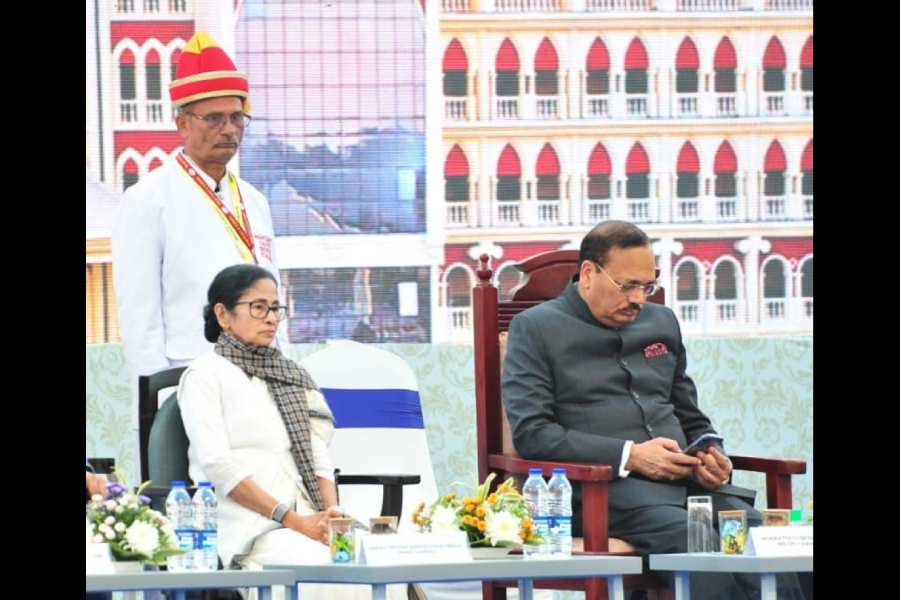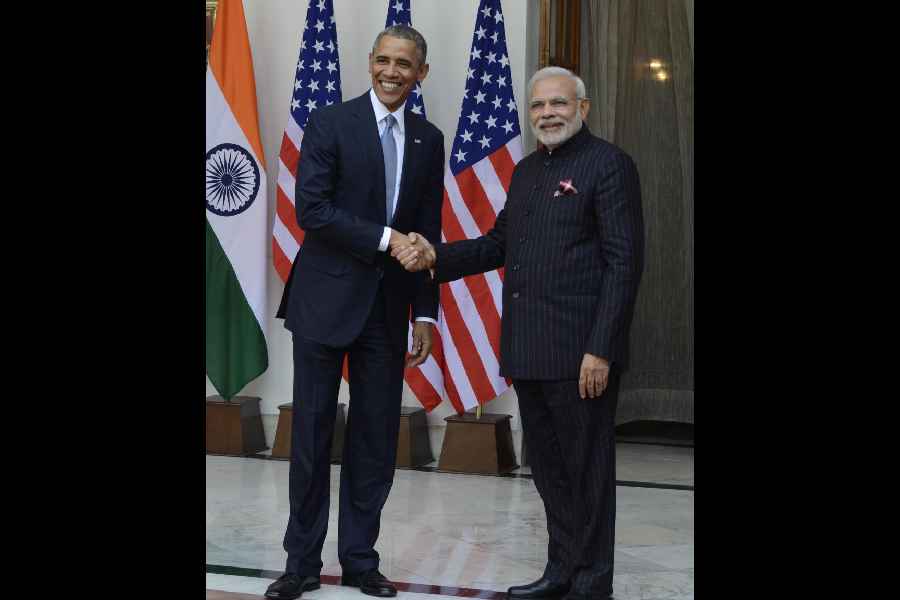New Delhi, Nov. 6: Prime Minister Narendra Modi today attempted to re-define his government's concept of reforms, characterising the journey to a recast set of objectives as a long marathon - rather than a "sprint" - to transform India by creating a better life for the poor in the country.
Clearly smarting under a rising tide of criticism against his government over its failure to push the much-awaited Big Bang Reforms, Modi tried to change the goalposts and the contours of the discourse by suggesting that "the goal of reforms is not better headlines in the pink papers (the financial dailies)."
"What is the aim of reform? Is it just to increase the measured rate of GDP growth? Or, is it to bring about a transformation in society?" Modi asked in his now typical faux Socratic style of questioning, with the difference that he gets to provide all the replies.
"My answer is clear. We must reform to transform."
Reform, he said, could never be an end in itself but rather "just a way station on the long journey to the destination".
"The second question is, reform for whom? Who is the target audience? Is our aim to impress groups of experts and score points in intellectual discussions? Or to achieve ranks in some international league table?
"Again, my answer is clear. Reform is that which helps all citizens, and especially the poor, achieve a better life. It is sabka saath, sabka vikas," Modi said at the Delhi Economics Conclave.
The inclusive slogan came in the middle of the intolerance debate, which was punctuated today with economic logic by former Prime Minister Manmohan Singh who said: "Freedom is also essential for economic development.... The prerequisite for innovation, entrepreneurship and competition is an open society and a liberal polity where individuals are free to pursue their ideas."
Modi's pitch in the name of the poor - so familiar down the decades - and the reference to "headlines" came at a time Arun Shourie, a former NDA minister and journalist, had described the Modi government as "Congress plus a cow". Shourie had also said that for this government, managing the economy meant "managing the headlines".
The Prime Minister's speech was seen by some political sources as a preparation of ground for maintaining the status quo in case the BJP-led alliance loses the Bihar elections.
Even if the NDA wins the polls, the nature of reforms is unlikely to change - given the Prime Minister's definition of reforms and his inability not to antagonise the Opposition without whose cooperation key changes cannot be legislated.
Today, while Modi cavilled about the excessive focus on GDP growth that his critics have tended to highlight while blaming him for failing to jumpstart a faltering economy, he didn't flinch while taking credit for the fact that GDP had risen and inflation had dipped in the 17 months since he assumed office.
GDP growth slowed to 7 per cent in the first quarter ended June from 7.5 per cent in the previous quarter. Analysts will eagerly wait to see how the economy fared in the second quarter with the big number due to be released on November 30.
But this masks the elaborate sleight of hand that the Modi government undertook in January when it rejigged the methodology for calculating national income statistics with the base year set as 2011-12.
The Reserve Bank of India governor, economists and analysts have all expressed misgivings about the new methodology which has suddenly turned India into the fastest growing economy in the world - a macro-economic fact that is at odds with the slow pace of industrial growth, weak farm sector performance, declining growth in trade figures, and tepid corporate earnings - but that doesn't appear to have fazed the Prime Minister.
Modi, who was labelled as a reform-minded agent of change in a Goldman Sachs report in November 2013 during the run-up to the general election, is clearly uneasy about delivering on the sort of reforms that the world has expected from him - and has, therefore, chosen to recast his goals in a few banalities and some bottom-of-the-pyramid measures, and to draw comfort from unproven and uncertified assumptions.
Take jobs. He claimed credit for the Micro Units Development and Refinance Agency (MUDRA) that has provided more than 6 million loans - a total of Rs 38,000 crore - to small businesses.
"If one conservatively estimates that each loan creates two jobs, we have laid the foundation for 12 million new jobs," he said, showing unjustified faith in an assumption that hasn't been supported by either job statistics or anecdotal evidence. "Even Rs 200,000 crore invested in the corporate sector would not produce this many jobs," he added.
The Prime Minister broke down his reforms into three categories: financial, structural and institutional.
He said the Jan Dhan Yojana had brought 190 million people into the banking system with Rs 26,000 crore stashed in these accounts, sparking a "quiet revolution that has hardly been noticed".
He said interference in banking decisions had ended - which doesn't square with the facts on the ground where the RBI has come under intense pressure to pare rates, and banks have been persuaded to shovel credit to small borrowers without insisting on a collateral to protect them from the risk of defaults.
But he glossed over the fact that several decisions of his government have been seen as anti-reform and regressive.
The oil pool account - a financial cushion created out of the surplus money earned because of the difference between the costs of cheap crude oil imports and the costs of producing and selling petro-products in the country - has been quietly re-created, a throwback to a system that prevailed in the early eighties. The fund was used to pay subsidies to state-owned oil companies to compensate them for the loss of selling products at subsidised rates.
The Modi government has decontrolled diesel prices, eliminating a major source of energy subsidies. But while doing so, it has chosen not to abandon the oil pool account, preferring to either retain it as a hedge against rising crude prices in the future or as a source of easy money for undefined purposes.
He said his government had slapped a carbon tax on fossil fuel, drawing attention to the coal cess that quadrupled from Rs 50 per tonne to Rs 200 per tonne. "Globally, there is much talk of carbon taxes but much of it is just that - talk. We have actually acted."
He also spoke about the ease of tax refunds that his government had brought about with 91 per cent of electronic returns processed in 90 days. But he didn't come up with any credible plan to widen the income tax base that has just over 33 million taxpayers - less than 3 per cent of the population.
But economists refuse to be churlish about acknowledging the achievements of the Modi government.
Said Rajiv Kumar, senior fellow at the Centre for Policy Research: "Modi is trying to address the problems faced by the people at the bottom of the pyramid. Although his definition may surprise some, reform measures like the financial inclusion programme brings in financial empowerment to a vast section of the population. The direct benefit transfer scheme is another measure that has been successfully implemented."
"It's true that big bang reforms like the goods and services tax had been expected from this government. But the Prime Minister's reform agenda has been to empower the people by policy and administrative intervention," said Devendra Pant, chief economist with India Ratings and Research Pvt Ltd.
Both agreed that many of the reform measures that the government was implementing had been initiated or conceptualised during the previous UPA regime.












